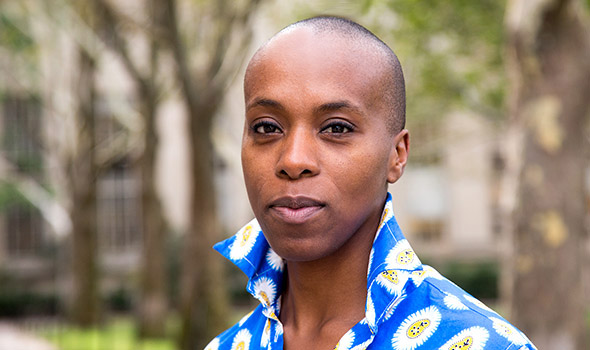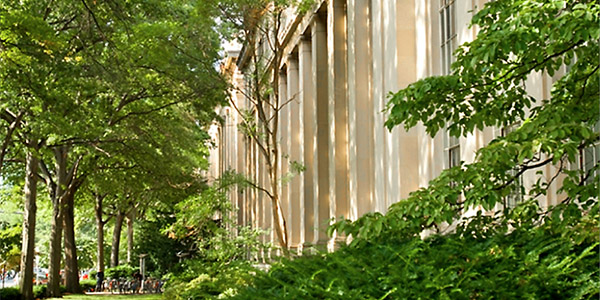AWARDS AND HONORS
MIT Anthropologist Amah Edoh receives Baker Award for Excellence in Undergraduate Teaching

Photo by Jon Sachs / SHASS Communications
“Learning is not just about having a professor transfer knowledge but also about the life-long lessons that you pick up from teachers in the process. Professor Edoh is a great example of a teacher who teaches students for life."
— from a student nomination
Announcement by MIT Anthropology
22 May 2020
Amah Edoh, Assisant Professor in Anthropology, has received the Everett Moore Baker Award for Excellence in Undergraduate Teaching. This Institute-wide award, named in honor of Everett Moore Baker, Dean of Students from 1947-1950, is given every year to an MIT faculty member, recognizing an “exceptional interest and ability in the instruction of undergraduates.” As the Prize parameters specify, “this is the only teaching award in which the nomination and selection of the recipients is done entirely by the students.”
As William Tinsdale, Associate Professor of Chemical Engineering, MacVicar Faculty Fellow, and Faculty Advisor to the Baker Foundation Advisory Committee communicated to Edoh,
The student selection committee was highly impressed with the multiple nomination letters we received extolling your teaching in “Africa and the Politics of Knowledge.” Even more, every student letter went beyond the way you challenged them to rethink the world through teaching and to describe the individual impact you have made in their lives. You are widely regarded by our undergraduate students as a mentor, a role model, and someone who is truly making a difference in their lives. For that, we celebrate you.
Africa and the Politics of Knowledge
Edoh, who studied political science as an undergraduate at MIT and then moved to graduate study in MIT’s Doctoral Program in History | Anthropology | Science, Technology, and Society (MIT HASTS), centers her research on how Africa as a place, concept, object of knowledge, and site of identity formation is created in everyday as well as global material practice.
She is at work on a book entitled Our Grandmothers’ Cloth: Materiality, Class, and Global Membership in the Age of “The New Africa,” which draws on extensive anthropological fieldwork in the Netherlands, the United States, and Togo, as well as on Edoh’s experience as a dual Togolese and American citizen. The in-progress book tracks how Dutch Wax cloth (aka African print cloth) circulates as a symbol, material, and commodity in those global circuits in which visions of Africa’s future are articulated. The class for which Edoh won the Baker Prize, “Africa and the Politics of Knowledge” is deeply informed by Edoh’s research.
A role model
Students noted that Edoh’s teaching, like her research, compellingly brings together intellectual and biographical elements. One student noted that she first came to know Edoh outside the classroom, through work with the African Studies Association and MISTI-Africa, and that once she took Edoh’s class, she was affirmed in her “passion to teach and establish new educational systems in sub-Saharan Africa.” This student also saw Edoh as a scholarly and personal role model: “as one of the only two black female faculty I know, she has been a true reflection of myself occupying space that I want to be in, paving the way for young black women like me.”

MIT Building 4, next to Killian Court
"I wish I could have thanked and celebrated with you in person at the Awards Convocation. But, even at a distance, know that you have my deepest gratitude. Thank you for being the brilliant, inspiring, impressive humans that you are. I am excited to watch as you grow into teachers and mentors yourselves. It is entirely my privilege to follow you on your journeys.”
— Amah Edoh, responding to news of the award, and with a message to her students
Inclusion and respect
Other students remarked upon Edoh’s vital work to bring together the academic, the personal, and the political, with one telling the committee that “Learning is not just about having a professor transfer knowledge but also about the life-long lessons that you pick up from teachers in the process. I believe Professor Edoh is a great example of a teacher who teaches students for life. The entire African and African-American student population has appreciated her support and representation here at MIT.”
Inclusion of and respect for student points of view was a recurring theme. Edoh was celebrated as “an engaging instructor who sources input from all students during discussions and creates an inclusive environment.” Another student agreed, writing that Edoh “validates our opinions and points of view while still asking us questions and making comments to help us think about things critically.”
Edoh also won praise for helping her students through the difficult first months of the current coronavirus pandemic: “Edoh’s efforts to help us with the transition to virtual learning this semester … recognized the various levels of hardship that come with living as a student in a pandemic, and just that amount of acknowledgment made all the difference.” Even across the embodied to the remote experience, the student wrote, "This is hands down one of my favorite classes I have taken in college.”
“As an alumnus of MIT,” another student observed, Edoh “really understands how difficult things can get … She makes it her mission to help students navigate the difficulties of academia. The more people who can be exposed to her teaching style and genuine nature,” the student concluded, “the better off MIT as a whole will be!”
Teachers and mentors through time
When Edoh learned of this prize, she wrote to the committee, “What a tremendous honor. I am deeply touched and humbled by this recognition. I so treasure working with our students, it means everything to hear them reflect on our time together as they did.”
She wrote, too, to her students, reflecting on the life of learning and teaching: “Having teachers and mentors who have believed in me and who inspire me and remind me when I forget that I have something worthwhile to offer has had an immeasurable impact on my own life path; this award honors them also, for modeling for me what a good, kind, human teacher is. I hope I can do for my students even a small fraction of what these role models have done for me.
I wish I could have thanked and celebrated with you in person at the Awards Convocation. But, even at a distance, know that you have my deepest gratitude. Thank you for being the brilliant, inspiring, impressive humans that you are. I am excited to watch as you grow into teachers and mentors yourselves. It is entirely my privilege to follow you on your journeys.”
The MIT Anthropology faculty are immensely proud to have Professor Edoh among us as a colleague and inspiration.
Suggested links
3Q with Amah Edoh on African and Innovation
OCW Chalk Radio Podcast with Amah Edoh: How Africa has been made to mean
MIT HASTS
Doctoral Program in History / Anthropology / Science, Technology, and Society
The Human Factor Series
Humanistic research on the societal dimensions of global challenges